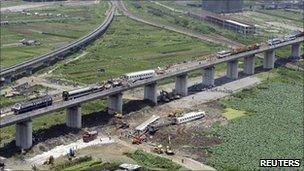China train crash: Relatives mourn victims
- Published
Mourners came to the crash site to lay flowers and remember those lost
Relatives of those killed in Saturday's train crash in China have visited the scene of the accident and paid tribute to their loved ones.
Family members lit incense and laid flowers underneath the viaduct near the eastern city of Wenzhou where four train carriages fell about 30m (100ft).
Some mourners expressed dismay at the railways ministry's handling of the tragedy, in which 40 people died.
Officials believe a faulty signal may have caused the crash.
Six carriages derailed and four fell between 20m to 30m from the viaduct after Saturday night's crash, which injured nearly 200 people.
The crash has provoked an outpouring of anger over the conduct of the government in pushing for rapid development of high-speed train lines.
Many web users, and even some state-media outlets, have accused officials of putting economic development above the safety of the people.
Chinese Premier Wen Jiabao, who visited the crash site on Thursday, vowed to "severely punish" those responsible.
But his mission to soothe people's concerns was at risk of being overshadowed by another public-relations gaffe.
Mr Wen explained that he had not been able to visit the crash site earlier because he had been in hospital receiving treatment for the previous 11 days.
But web users were quick to point out official news reports of Mr Wen meeting various foreign dignitaries and chairing meetings earlier in the week.
Emotional scenes
On Friday, about two dozen relatives gathered at the crash site to lay flowers and burn incense.
Some also gathered at the mortuary where the bodies of the victims were taken.
One of the mourning relatives at the mortuary criticised the railways ministry over its handling of the compensation negotiations with families.

The amount of compensation for bereaved relatives is to be almost doubled
"Today, the district office told us that if we do not sign [the compensation agreement], they are going to leave," Zhang Meilan, who lost her niece, told Reuters news agency.
"They said if we want to wait, we can wait here but they would not care about us. What kind of rationale is this?"
State media later reported that the amount of compensation for bereaved relatives would be almost doubled.
Xinhua news agency said they would now receive 915,000 yuan ($142,000; £87,000) - up from an initial offer of 500,000 yuan.
Amid emotional scenes at the mortuary, one relative told journalists how her husband, Chen Wei, had last spoken to her on the telephone while he was on the train, telling here he would be home in time for dinner.
"I kept calling out to him but there was no response. He just left us, a wife and son, like this," said 40-year-old Liu Canlan.
"How could this happen? How can this high-speed train be so lousy? It's just like a tiger that eats people up."
The accident came four years after the opening of the country's first high-speed railway line - one of the government's flagship projects.
Rail experts had warned against the rush to build the world's longest and fastest high-speed rail network in record time amid safety concerns.
Critics of the government allege that corners were cut during construction because of corruption, raising questions about infrastructure across the country.
- Published28 July 2011
- Published28 July 2011
- Published28 July 2011
- Published25 July 2011
- Published24 July 2011
- Published24 July 2011
- Published23 March 2011